Trump's sentencing: everything you need to know
Defendants normally plead for leniency. Trump is too busy slandering the judge.

PN is a reader-supported publication made possible by paid subscribers. Appreciate our independent journalism? Then please sign up to support us.
With Donald Trump’s sentencing for his 34 felony convictions just a month away, speculation about the criminal consequences for the former president is reaching a fever pitch.
What will Trump do at the sentencing hearing? Will he be sentenced to jail time? Could he be on house arrest during the appeal, leading to the surreal possibility he might have to deliver his nomination acceptance speech during the Republican National Convention via video?
Judge Juan Merchan released Trump on his own recognizance, which means he will remain free until his sentencing unless he does something that would get that revoked. New York state criminal law allows a judge to revoke an order of recognizance if the defendant commits certain felony offenses or intimidates a victim or witness. You’d think Trump could resist intimidating witnesses for the next 30 days, but recall that he has already asked the court to terminate his gag order so that he can engage in what his lawyers called “unrestrained campaign advocacy” — lawyer-speak for thuggish calls to violence.
Today, Trump will have his first meeting with a probation officer. Since he was released on his own recognizance, he can attend via video from Mar-a-Lago.
Letting Trump go back to Florida and do the hearing virtually was an unusual privilege for the court to extend, as normally these are in-person visits to the probation department. Indeed, Trump has been granted an enormous amount of slack not shown to other criminal defendants.
In this instance, however, there’s a reason for that slack. Former New York City Department of Corrections and Probation commissioner, Martin Horn, explained that it would also be very disruptive to the entire probation office to have Trump, his attorneys, his Secret Service detail, and the press descend on the Manhattan probation office.
A note from Aaron: Working with brilliant contributors like Lisa requires resources. If you aren’t a paid subscriber, please click the button below to support our work.
This initial probation meeting is so that Trump’s probation officer can create a pre-sentencing report, normally detailing Trump’s criminal and personal history, employment, financial resources, and living situation. It’s also an opportunity for Trump to explain why he deserves a light sentence. This information is then put into a pre-sentencing report and given to Judge Merchan.
The maximum sentence Merchan could impose is four years of incarceration for each of the 34 counts. In theory, those could be imposed consecutively — 34 sentences of 4 years in a row. It’s far more likely that if Merchan were to impose a jail sentence, he’d have those run concurrently — all at the same time. Trump has already demanded, via Truth Social, that the US Supreme Court step in and block any sentencing, but it’s doubtful the Court would do that unless the jail term imposed were somehow wildly outside of the presumptive sentence range.
At the July 11 sentencing hearing, Trump will have an opportunity to speak. Defendants can plead for leniency during the hearing, but that usually requires the defendant to take responsibility for their actions and apologize for wrongdoing. The problem for Trump here, of course, is that he doesn’t think he did anything wrong and that Joe Biden somehow weaponized the New York state court system to prevent Trump from becoming president. Those are not things likely to land well with Judge Merchan during sentencing. Trump also has the option to say nothing, which might be best.
If Merchan were to sentence Trump to jail, he would have some choices on timing. Merchan could require Trump to report to jail right away, which would mean Trump would be incarcerated during the RNC. The more likely path is that Merchan would impose a sentence and then stay it during the appeal process, meaning Trump could stay out of jail while his appeal works through the New York appellate courts. That process is slow enough that it would last well past the election.
This, of course, leads to the distinctly weird possibility that Trump could be sentenced to jail, have that sentence stayed during his appeals, win the election during the appeal phase, but lose the appeal, and have his sentence kick in while he’s in the Oval Office. Our rules and norms aren’t built to address the possibility that a president might need to govern from Rikers for a time. And Trump cannot pardon himself, as this is a state conviction, not a federal one.
Trump, ever the macho guy, said he would be fine with jail or house arrest as a sentence but that it would be “tough for the public to take.” With the RNC falling just a few days after the sentencing, the organizers need to plan for the possibility their frontrunner might not be able to attend. If he were actually in jail, it’s difficult to imagine he could Zoom into the convention. If he were on house arrest, presumably he would participate by video.
Trump is unlikely to see the inside of a cell
Most legal experts seem to agree that Trump will likely not be sentenced to jail time.
Indeed, Judge Merchan already showed he is disinclined to send Trump to jail, letting him rack up 10 instances of contempt of court for violating the gag order but not putting him behind bars.
Lauren-Brooke Eisen of the Brennan Center for Justice told NPR it would be “very unlikely for someone who has never been convicted of a crime to go to prison ... for their first offense, which is nonviolent." New York defense lawyer Andrew Weinstein, who represented someone in a similar case, told Reuters it was “not the kind of case where you would expect a first-time white-collar offender to receive a sentence of incarceration.” However, one analysis showed that roughly 10 percent of people convicted of these charges do face some prison time, and some former New York prosecutors have said prison time is likely if only to show that Trump is not above the law.
Trump and his supporters are most likely hoping for probation, which would by and large allow him to keep running for president with relatively few restrictions. However, probation poses some unique problems for Trump.
One of the standard conditions of probation in New York is that a defendant cannot associate with “disreputable persons,” which typically means people with criminal convictions. This wouldn’t be a big deal for former presidents not named Trump, but since he has surrounded himself with the shadiest of characters, there are several people he wouldn’t be allowed to see.
Former top Trump adviser Steve Bannon is just getting ready to serve his sentence for contempt of Congress. Another former Trump adviser, Peter Navarro, served four months for the same thing earlier this year. Trump attorney Jenna Ellis didn’t go to jail, but she did plead guilty to a single felony count in the Georgia election interference case.
Sidney Powell and Kenneth Chesebro, both instrumental figures in Trump’s coup attempt, also took plea deals in the Georgia case. Former Trump Organization CFO Allen Weisselberg has already done two prison stints. And then, of course, there are all the people who were convicted but pardoned by Trump, such as Roger Stone and Paul Manafort. Since New York state has never grappled with a defendant who pardoned his previous criminal associates, it’s unclear whether those individuals count as disreputable.
It can feel a bit disheartening that this is the lone criminal conviction we’ll see before the election and that the nature of the charges makes a steep sentence unlikely. It’s important to remember, however, that this conviction is proof positive Donald Trump is not Teflon.
Twelve everyday random New York City citizens showed he is not invincible. There are consequences for his actions even if he does not see the inside of a jail cell, if for no other reason than that the appeal and sentencing process will be a distraction for him for the rest of the 2024 election cycle.
The federal courts, stuffed with Trump appointees, are there to protect him, but the New York state court system is not beholden to him at all, a fact which must drive him mad. The wheels of justice grind on, whether Trump wants them to or not.
That’s it for today
We’ll be back with more Wednesday. If you aren’t one already, please support Public Notice by signing up. Paid subscribers make this newsletter possible.
Thanks for reading.







At sentencing the judge should confront Trump about his statements about the judge and the court and give him the chance to repeat or retract them … if he doesn’t back down, he should be held in contempt and jailed immediately. Soft treatment of Trump over his entire adult life has enabled the rise of fascism and it needs to stop now. I’m sick of the “legal experts” enabling the destruction of our legal system.
I'm not necessarily disheartened, however, many legal experts immediately buy Trump's BS and that is disheartening. On the charges that Leticia James brought, you had talking heads saying that it was a victimless crime. Fraud! Victimless?! In NYC?!
Now, I'm reading articles that Fani Willis "blew it". Just don't even start with me on that one. There are no rules against the relationship, she didn't pay her boyfriend more money, she didn't accept gifts from him. Period. Keep in mind that she is bringing RICO charges against Trump for committing a coup. These are not equal issues.
Do better America.